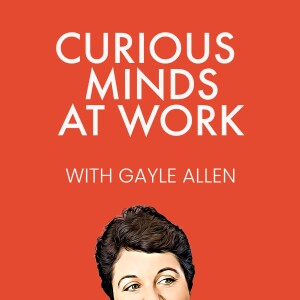
CM 085: Philip Auerswald on the Human Side of Code
 2017-08-14
2017-08-14
Download
Right click and do "save link as"
Could our code be making us more human?
When most of us hear the word code, we think of computer code -- the digital instructions that drive our devices. But when Philip Auerswald hears the word code, he sees the instructions that drive the human race.
Phil is the author of the book, The Code Economy: A Forty-thousand Year History. He is an Associate Professor at the School of Policy and Government at George Mason University, a Senior Fellow at the Kauffman Foundation, and Executive Director of the Global Entrepreneurship Research Network. He is also the co-founder of Innovations, a journal on entrepreneurial solutions to global challenges.
Phil believes that as machines and algorithms play ever bigger roles in our lives, we will actually become more human. This long view of automation--a 40,000-year view--also gives us insight into a different, more innovative perspective on how to think about the future of work.
In this interview we discuss:
A broader definition of code as the DNA of human society from the simple to the complex
The importance of getting beyond singularity vs dystopian views of humans vs machines
How humans will redefine their own value -- as they have done repeatedly -- as robots, machines and algorithms play a bigger role in our world
The fact our ability to learn -- to experiment and share what we learn -- is what sets us apart
How human beings are constantly exploring spaces of possibility
How evolving understanding, knowledge, and knowhow results from finding the adjacent possible
The fact that cities are actual platforms in that they stand on problems solved in literal ways -- sewage and electric power and subway transport
How platforms of today are increasingly digital
The concepts of bifurcation and substitution where a product is split over time into cheap and high volume vs expensive and low volume, as in watches and clocks
How high volume and low cost items typically lend themselves to automation
The fact that we are trying to recapture a 1960s way of living and working that is no longer viable
How we need to rewire rather than retire
The concept of a job has only been around for about 150 years due to the introduction and growth of large-scale institutions that needed people serve in a role and act on specific routines
Why subsidizing higher education and retirement are not the right ways to think about the problem of machines, robots, and automation
Why the evolutionary nature of ideas and actions opens us up to abundance and new opportunities
How it is almost irrational to think our creative processes will come to an end
How the inequality that exists within cities and between cities and rural parts of the U.S. are the driver of political discord
Links to Topics Mentioned in this Podcast
@auerswald
http://auerswald.org/
Stuart Kauffman
Rise of the Robots by Martin Ford
Shinola
Nexus by Ramez Naam
Milton Friedman
Permanent income hypothesis
Otto von Bismarck
Larry Harvey and Burning Man
The Absence of Design in Nature
Scale by Geoffrey West
Jose Lobo
Progress and Poverty by Henry George
The Origin of Populist Surges Everywhere by Philip Auerswald
If you enjoy the podcast, please rate and review it on iTunes - your ratings make all the difference. For automatic delivery of new episodes, be sure to subscribe. As always, thanks for listening!
view more
More Episodes
CM 248: Vanessa Patrick On How To Say No
 2023-09-11
2023-09-11
 2023-09-11
2023-09-11
CM 247: Thomas Curran on the Perfection Trap
 2023-08-28
2023-08-28
 2023-08-28
2023-08-28
CM 239: Rina Bliss on Why IQ is a Myth
 2023-05-08
2023-05-08
 2023-05-08
2023-05-08
012345678910111213141516171819
Create your
podcast in
minutes
- Full-featured podcast site
- Unlimited storage and bandwidth
- Comprehensive podcast stats
- Distribute to Apple Podcasts, Spotify, and more
- Make money with your podcast
It is Free
- Privacy Policy
- Cookie Policy
- Terms of Use
- Consent Preferences
- Copyright © 2015-2024 Podbean.com




